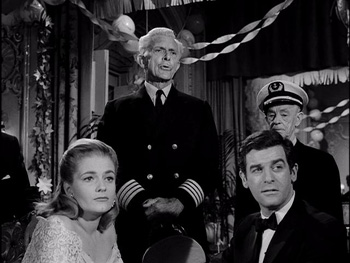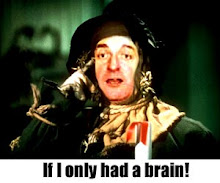Passage on the Lady Anne
 Sailing into the Twilight Zone
Sailing into the Twilight ZoneThis is not really a 'Twilight Zone' story despite Serling's closing attempt to give it an air of mystery. The Season Four 'Twilight Zone' episode, 'Passage on the Lady Anne' is as close as Charles Beaumont got to writing a standard drama. Goodness knows what he might have been like if they let him loose in the mainstream.
A couple whose marriage is on the rocks take a trip on a rust bucket of a cruise liner in an attempt to save their marriage. Standard fare, you might think, except that they find that they are the only people on board under the age of 75, oldsters who constantly threaten and cajole the couple to get off. This gives the producers the opportunity to trot out some excellent old stars, some regulars of The Twilight Zone series, but given here a chance to show why they got so much work. Wilfrid Hyde-White, Cecil Kellaway, Alan Napier, and good old Gladys Cooper (she who fought Robert Redford's 'Death') form part of a passenger list who have no intention of reaching their destination (whether that be The Twilight Zone or not).
Effectively Beaumont uses a nice interweaved bi-partite structure rather than just subplot/plot; each is as relevant in its own way. On one hand the couple save their marriage (conventionally, but still touchingly), on the other, the ship's crew and passengers plot their own destruction (while deciding the young couple 'need not die'). It's strange how something so sentimental could nevertheless have such an unpleasant theme running through it. Frequently I was reminded of Shirley Jackson and her 'The Summer People' and 'The Lottery'. Afterall this features a mass suicide and bizarre paranoia, and , were Beaumont not writing a 'Twilight Zone' episode, he probably would never have gotten away with it as traditional drama. Instead it can be brushed under the carpet with a few silly words by Serling as epilogue ('they disappeared into the Twilight Zone').
Needless to say the cast are excellent - Wilfred Hyde-White, Kellaway and Cooper standouts - with only Lee Phillips, as the young husband, letting the side down a little. It should also be said that director, Lamont Johnson, pulls off a few uncharacteristically distinctive shots (a close two shot by the rail, a shot through stairs), and the overall atmosphere is claustrophobic and decaying. A lot of this is achieved through the masterful stroke of using the ship's engines as a constant heartbeat to the story. Yes, indeed, there is a lot more going on here than meets the eye.
It's so easy to dismiss this episode as sentimental tosh, but think of what's actually going on (and how easy the oldsters were prepared to let the youngsters die), and you have to look again. It may be rose coloured light, but it's against a very dark backdrop. Pervading all Beaumont's episodes is a melancholy, a nostalgic yearning for a past world he could not have known (remember "Long Live Walter Jameson"). According to some sources this is his last authentic episode (later ones being ghost-written by Jery Sohl). It seems appropriate. So sad he died so young (38).
Labels: Charles Beaumont, The Twilight Zone


